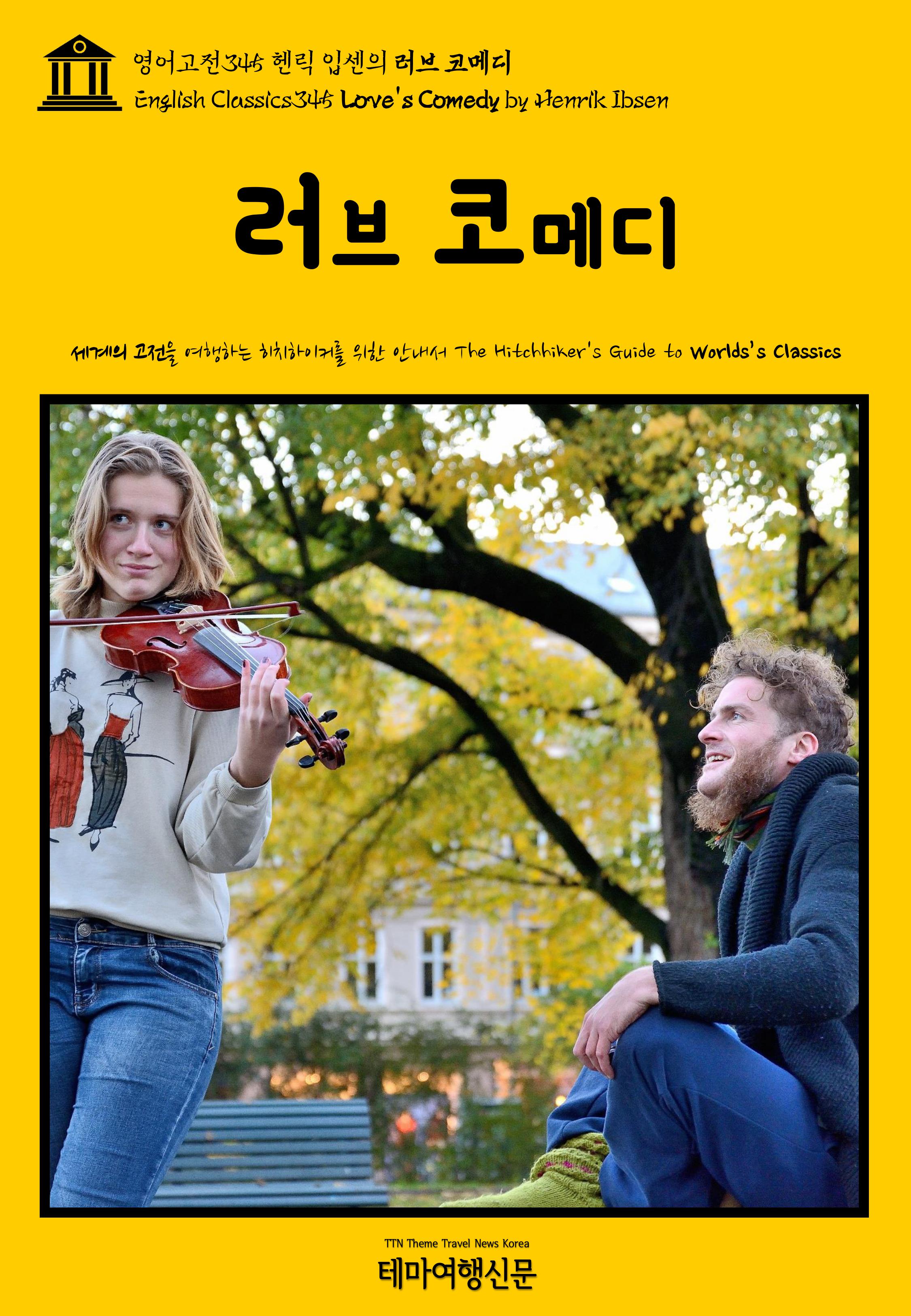Koerlighedens Komedie was published at Christiania in 1862. The polite world?so far as such a thing existed at the time in the Northern capital?received it with an outburst of indignation now entirely easy to understand. It has indeed faults enough. The character-drawing is often crude, the action, though full of effective by-play, extremely slight, and the sensational climax has little relation to human nature as exhibited in Norway, or out of it, at that or any other time. But the sting lay in the unflattering veracity of the piece as a whole; in the merciless portrayal of the trivialities of persons, or classes, high in their own esteem; in the unexampled effrontery of bringing a clergyman upon the stage. All these have long since passed in Scandinavia, into the category of the things which people take with their Ibsen as a matter of course, and the play is welcomed with delight by every Scandinavian audience. But in 1862 the matter was serious, and Ibsen meant it to be so.
Koerlighedens Komedie는 1862년 크리스티아니아에서 출판되었습니다. 당시 북부의 수도에 존재했던 정중한 세계는 이제 완전히 이해하기 쉬운 분노의 폭발로 그것을 받아들였습니다. 그것은 정말 충분히 결점이 있습니다. 캐릭터 소묘는 종종 조잡하고, 액션은 효과적인 장난으로 가득 차 있지만 극히 미미하며, 감각적인 클라이맥스는 노르웨이에서 보여지는 것과 같이 인간 본성과는 거의 관련이 없습니다. 그러나 그 따끔한 느낌은 전체적으로 작품의 적절하지 않은 진실성에 있었습니다; 사람이나 계급의 사소한 것에 대한 무자비한 묘사, 높은 존경심, 그리고 성직자를 무대로 불러모으는 본보기가 없는 무성의에 있었습니다. 이 모든 것은 스칸디나비아에서 오래전부터 사람들이 입센과 함께 가져가는 물건의 범주에 들어갔고, 이 연극은 스칸디나비아의 모든 관객들에게 즐거운 환영을 받고 있습니다. 그러나 1862년에 이 문제는 심각했고, 입센은 그렇게 하려고 했습니다.
For they were years of ferment?those six or seven which intervened between his return to Christiania from Bergen in 1857, and his departure for Italy in 1864. As director of the newly founded "Norwegian Theatre," Ibsen was a prominent member of the little knot of brilliant young writers who led the nationalist revolt against Danish literary tradition, then still dominant in well-to-do, and especially in official Christiania. Well-to-do and official Christiania met the revolt with contempt. Under such conditions, the specific literary battle of the Norwegian with the Dane easily developed into the eternal warfare of youthful idealism with "respectability" and convention. Ibsen had already started work upon the greatest of his Norse Histories?The Pretenders. But history was for him little more than material for the illustration of modern problems; and he turned with zest from the task of breathing his own spirit into the stubborn mould of the thirteenth century, to hold up the satiric mirror to the suburban drawing-rooms of Christiania, and to the varied phenomena current there,?and in suburban drawing-rooms elsewhere,?under the name of Love.
1857년 베르겐에서 크리스티아니아로 돌아온 것과 1864년 이탈리아로 떠난 것 사이에 6-7년의 발효가 있었습니다. 새로 설립된 "노르웨이어 극장"의 감독으로서, 입센은 덴마크 문학 전통에 대항하는 민족주의 반란을 이끌었고, 그 당시 여전히 부유하고, 특히 공식적인 크리스티아니아에서 지배적인 뛰어난 젊은 작가들의 작은 매듭의 중요한 일원이었습니다. 부유한 사람들과 공식적인 크리스티아니아는 반란을 경멸하며 맞섰습니다. 그러한 조건 하에서, 노르웨이와 데인강의 특정한 문학 전쟁은 쉽게 "존중성"과 관습을 가진 젊은 이상주의의 영원한 전쟁으로 발전했습니다. 입센은 이미 그의 위대한 노르드 역사에 대한 작업을 시작했습니다. 프레텐더들이요. 그러나 역사는 그에게 현대 문제의 삽화를 위한 재료에 불과했습니다; 그리고 그는 13세기의 완고한 틀에 자신의 정신을 불어넣는 일에서, 풍자적인 거울을 크리스티아니아의 교외 응접실, 그리고 현재의 다양한 현상으로, 그리고 교외의 드로인에서 열정을 가지고 돌아갔습니다. '사랑'이라는 이름으로 다른 곳에 있는 g-rooms입니다.
Yet Love's Comedy is much more than a satire, and its exuberant humour has a bitter core; the laughter that rings through it is the harsh, implacable laughter of Carlyle. His criticism of commonplace love-making is at first sight harmless and ordinary enough. The ceremonial formalities of the continental Verlobung, the shrill raptures of aunts and cousins over the engaged pair, the satisfied smile of enterprising mater-familias as she reckons up the tale of daughters or of nieces safely married off under her auspices; or, again, the embarrassments incident to a prolonged Brautstand following a hasty wooing, the deadly effect of familiarity upon a shallow affection, and the anxious efforts to save the appearance of romance when its zest has departed?all these things had yielded such "comedy" as they possess to many others before Ibsen, and an Ibsen was not needed to evoke it.
하지만 러브 코메디(Love's Comedy)는 풍자 그 이상이고, 그것의 풍부한 유머는 쓰라린 핵심을 가지고 있습니다; 그것을 통해 울려 퍼지는 웃음은 칼라일의 거칠고 무자비한 웃음입니다. 평범한 사랑 만들기에 대한 그의 비판은 일견 해롭지 않고 충분히 평범합니다. 대륙 베를로붕의 의례적인 형식, 약혼한 한 쌍에 대한 고모와 사촌들의 날카로운 환희, 진취적인 어머니-가족들의 만족스러운 미소, 그녀가 딸들 또는 조카들의 이야기를 그녀의 후원 아래 안전하게 결혼했습니다; 또는, 다시, 긴 Brautstand에 일어난 당혹스러운 사건들은 성급하게 뒤따릅니다.oing, 얄팍한 애정에 대한 친숙함의 치명적인 영향, 그리고 그것의 열정이 떠났을 때 로맨스의 외모를 구하기 위한 불안한 노력 - 이 모든 것들은 입센 이전에 그들이 소유했던 것과 같은 "코미디"를 생산했고, 그것을 환기시키기 위해 입센이 필요하지 않았습니다.
It is easy to understand the irony with which a man who thought thus of love contemplated the business of "love-making," and the ceremonial discipline of Continental courtship. The whole unnumbered tribe of wooing and plighted lovers were for him unconscious actors in a world-comedy of Love's contriving?naive fools of fancy, passionately weaving the cords that are to strangle passion. Comedy like this cannot be altogether gay; and as each fresh romance decays into routine, and each aspiring passion goes out under the spell of a vulgar environment, or submits to the bitter salvation of a final parting, the ringing laughter grows harsh and hollow, and notes of ineffable sadness escape from the poet's Stoic self-restraint.
사랑을 그렇게 생각한 남자가 "연애"의 사업과 대륙의 구애의 의례적인 훈련을 숙고한 아이러니를 이해하는 것은 쉽습니다. 그에게는 구애하고 곤경에 처한 연인들로 이루어진 무수한 부족 전체가 사랑의 계략에 대한 세계 코미디의 무의식적인 배우들, 즉 열정을 질식시킬 끈을 열정적으로 짜는 공상의 순진한 바보였습니다. 이와 같은 코미디는 완전히 게이가 될 수 없습니다. 각각의 신선한 로맨스가 일상으로 쇠퇴하고, 열망하는 각각의 열정이 저속한 환경의 마법 아래 사라지거나, 마지막 이별의 쓰라린 구원에 굴복함에 따라, 울리는 웃음은 거칠고 공허해지고, 말로 표현할 수 없는 슬픔의 음표는 시인의 금욕주의적 자제입니다.





